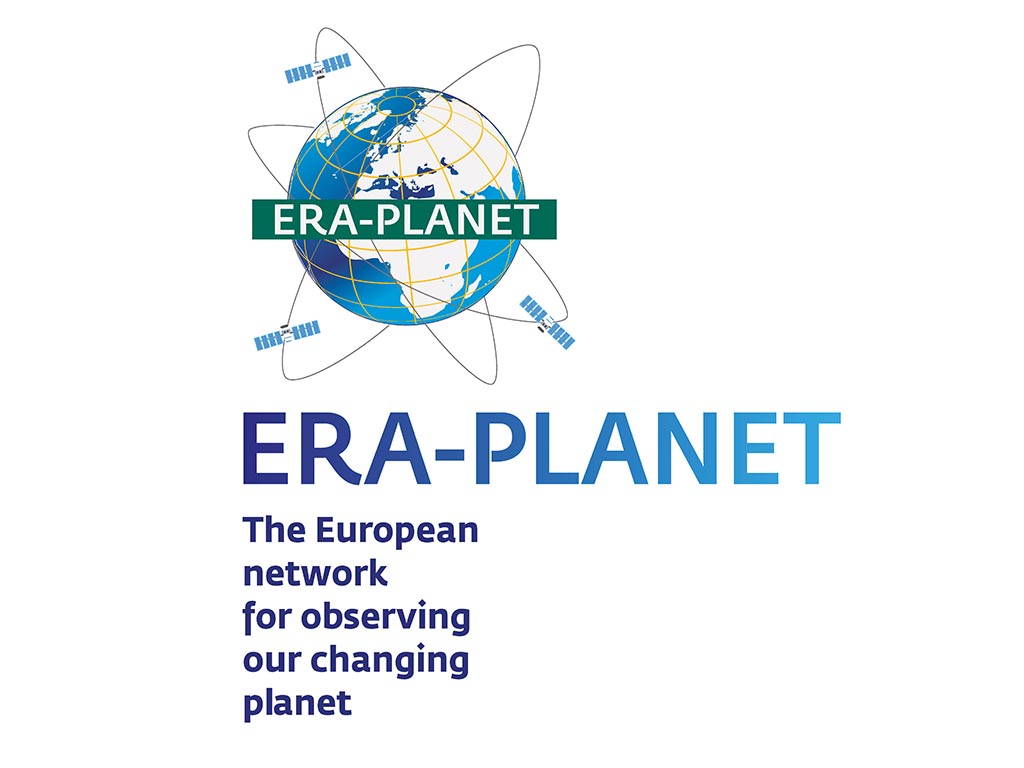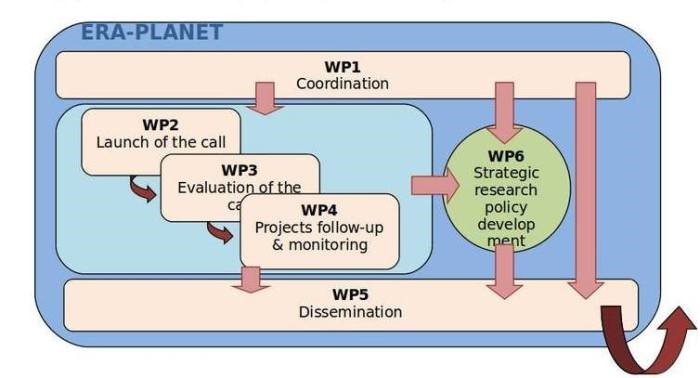ERA-PLANET
The European network for observing our changing planet
Categories: Bari | Changes and Transition | Concluded | Europeans | Florence | Rende | Knowledge transfer

Keywords: Management | impacts | environmental monitoring | research and innovation | monitoring systems
Funding: Horizon2020
Period: February 2016 - January 2022
Total project budget: ---
Total budget CNR IIA: ---
Abstract of the project
Over the past decade, a significant number of projects and programs in different areas of environmental monitoring and Earth observation have generated a significant amount of data and knowledge on various aspects related to quality and environmental sustainability. Big data generated by in-situ or satellite platforms is collected and stored with a plethora of systems and tools that make it difficult to share data and knowledge among stakeholders and policy makers to support key economic and social sectors.
The general objective of ERA-PLANET is to strengthen the European Research Area in the field of Earth observation in line with the European participation in the Group on Earth Observation (GEO) and Copernicus.

ERA-PLANET will be implemented through six WPs which are detailed in Section 3 of this project and interconnected as highlighted in the flow chart. To ensure efficient governance of the consortium and its activity in the preparation and launch of the Call, in the evaluation and selection of projects, in the follow up of projects, in the communication and dissemination of the main results of the projects and in the creation of a close collaboration the European research policy on Earth observation and supporting the EU and international ERA-PLANET environmental policy process is structured in 6 WPs which are briefly presented below.
WP1- Coordination and management of the consortium
The overall coordination and management of ERA-PLANET will be led by the CNR in close collaboration with all the WP Leaders and with the members of the Steering Committee. As a responsible leader, the CNR will help the partners to produce timely and high quality results, as well as the fulfillment of contractual obligations with the EC. The main objective of the WP is to ensure an efficient coordination of all the WPs and the Tasks of the project.
WP2 - Preparation and launch of the co-financed call
WP-2 will implement all necessary actions to ensure an efficient and transparent ranking of submitted proposals and to promote broad participation to present innovative ideas.
WP3 - Evaluation and selection of proposals
The purpose of this WP is the preparation of the Call for the selection of the Independent External Agency (IEA) responsible for the two-phase evaluation and proposal selection process, as well as to support the coordinators of the 4 selected proposals in the phase negotiation according to the rules set out in the H2020 model grant agreement for ERA-NET co-financing, the general annexes of the 2020-2014 H2015 work program, plus the Horizon 2020 proposal model for ERA-NET co-financing actions as published together with the call to submit proposals.
WP4 - Follow-up and monitoring of projects
The WP-4 is designed to ensure that ERA-PLANET projects are developed following the proposed agenda, generate excellent quality results and achieve all the objectives and expected results reported in their work plan. The results will be monitored and deviations from the workflow and timing will be reported to the coordinators and the ERA-PLANET Steering Committee in charge of taking the necessary actions. The DoA of the projects will be compared with the progress of the project and the final report to be sure that the activities and results committed are delivered as detailed in the DoA. The WP-4 will also monitor the level of communication between projects and with GEO to ensure the achievement of the common goal of ERA-PLANET.
WP5 - Communication, exploitation and dissemination of results
WP-5 describes the strategy and means that the Consortium will use to optimize the communication, dissemination and enhancement paths to be followed and consequently maximize the impact of the ERA-PLANET project.
WP6 - Development of strategic research policy, coordination of European programs and support of international policies
This WP is designed to ensure that ERA-PLANET projects develop their activities in the context of the European research policy on OE. This will imply that all activities carried out in ERA-PLANET must be well aligned with the main European EO programs and their environmental applications, at national, EU and international level (Copernicus; ESA programs; the new GEO ten-year plan). In addition, WP-6 will support project participation in EO's leading international frameworks, mainly GEOs, and will help support the European contribution to international policy development to which all of these programs will contribute.
WP1- Coordination and management of the consortium
The overall coordination and management of ERA-PLANET will be led by the CNR in close collaboration with all the WP Leaders and with the members of the Steering Committee. As a responsible leader, the CNR will help the partners to produce timely and high quality results, as well as the fulfillment of contractual obligations with the EC. The main objective of the WP is to ensure an efficient coordination of all the WPs and the Tasks of the project.
WP2 - Preparation and launch of the co-financed call
WP-2 will implement all necessary actions to ensure an efficient and transparent ranking of submitted proposals and to promote broad participation to present innovative ideas.
WP3 - Evaluation and selection of proposals
The purpose of this WP is the preparation of the Call for the selection of the Independent External Agency (IEA) responsible for the two-phase evaluation and proposal selection process, as well as to support the coordinators of the 4 selected proposals in the phase negotiation according to the rules set out in the H2020 model grant agreement for ERA-NET co-financing, the general annexes of the 2020-2014 H2015 work program, plus the Horizon 2020 proposal model for ERA-NET co-financing actions as published together with the call to submit proposals.
WP4 - Follow-up and monitoring of projects
The WP-4 is designed to ensure that ERA-PLANET projects are developed following the proposed agenda, generate excellent quality results and achieve all the objectives and expected results reported in their work plan. The results will be monitored and deviations from the workflow and timing will be reported to the coordinators and the ERA-PLANET Steering Committee in charge of taking the necessary actions. The DoA of the projects will be compared with the progress of the project and the final report to be sure that the activities and results committed are delivered as detailed in the DoA. The WP-4 will also monitor the level of communication between projects and with GEO to ensure the achievement of the common goal of ERA-PLANET.
WP5 - Communication, exploitation and dissemination of results
WP-5 describes the strategy and means that the Consortium will use to optimize the communication, dissemination and enhancement paths to be followed and consequently maximize the impact of the ERA-PLANET project.
WP6 - Development of strategic research policy, coordination of European programs and support of international policies
This WP is designed to ensure that ERA-PLANET projects develop their activities in the context of the European research policy on OE. This will imply that all activities carried out in ERA-PLANET must be well aligned with the main European EO programs and their environmental applications, at national, EU and international level (Copernicus; ESA programs; the new GEO ten-year plan). In addition, WP-6 will support project participation in EO's leading international frameworks, mainly GEOs, and will help support the European contribution to international policy development to which all of these programs will contribute.
The overall objective of ERA-PLANET is to strengthen the European Research Area in the field of Earth observation in coherence with the European participation in the Group on Earth Observation (GEO) and Copernicus. The expected impact is to strengthen European leadership in the next GEO 2015-2025 work plan. ERA-PLANET will strengthen the interface with user communities, whose needs the Global Earth Observation System (GEOSS) intends to address
The specific objectives of ERA-PLANET are:
Prepare and launch a joint transnational call in two phases structured along the following lines:
Financing projects according to a priority list set by external experts.
Monitor funded projects and report progress accordingly.
Develop a strategic research agenda to strengthen the ERA and coordinate the cooperation and interconnection of European and national programs in key and selected EO domains.
Coordinate initiatives with the aim of improving interoperability between existing and future projects on EO and links to the GCI.
The specific objectives of ERA-PLANET are:
Prepare and launch a joint transnational call in two phases structured along the following lines:
Financing projects according to a priority list set by external experts.
Monitor funded projects and report progress accordingly.
Develop a strategic research agenda to strengthen the ERA and coordinate the cooperation and interconnection of European and national programs in key and selected EO domains.
Coordinate initiatives with the aim of improving interoperability between existing and future projects on EO and links to the GCI.
National Research Council - Institute on Atmospheric Pollution, Italy - Coordinator
Aarhus Universitet, Denmark
Idryma Iatroviologikon Ereunon Akademias Athinon, Greece
Aristotelius Panepistimius Thessalonikis, Greece
Alfred-Wegener-Institut Helmholtz-Zentrum Fur Polar- Und Meeresforschung, Germany
Centro Nacional De Informacion Geografica, Spain
Center National De La Recherche Scientifique Cnrs, France
Centro De Investigacion Ecologica Y Aplicaciones Forestales, Spain
Chalmers Tekniska Hoegskola Ab, Sweden
Centrum Vyzkumu Globalni Zmeny Av Cr Vvi, Czech Republic
Eesti Maaulikool, Estonia
Friedrich-Alexander-Universitaet Erlangen-Nuernberg, Germany
Fundacao Para A Ciencia EA Technology, Portugal
Ilmatieteen Laitos, Finland
Forschungsverbund Berlin Ev. Germany
Forschungszentrum Julich Gmbh, Germany
Helmholtz Zentrum Potsdam Deutschesgeoforschungszentrum Gfz, Germany
Helmholtz-Zentrum Geesthacht Zentrum Fur Material- Und Kustenforschunggmbh. Germany
Internationales Institut Fuer Angewandte Systemanalyse. Austria
Higher Institute for Environmental Protection and Research, Italy
Ivl Svenska Miljoeinstitutet Ab, Sweden
Institut Jozef Stefan, Slovenia
Museum Fur Naturkunde - Leibniz-Institut Fur Evolutions- Und Biodiversitatsforschung An Der Humboldt-Universitat Zu Berlin, Germany
Masarykova Univerzita, Czech Republic
“National Center For Scientific Research“ Demokritos ”, Greece
Ethniko Asteroskopeio Athinon, Greece
Paul Scherrer Institut, Switzerland
Senckenberg Gesellschaft Fur Naturforschung, Germany
Space Research Institute Of The National Academy Of Sciences Of Ukraine And The National Space Agency Of Ukraine, Ukraine
Leibniz Institut Fuer Troposphaerenforschung EV, Germany
Helmholtz-Zentrum Fur Umweltforschung Gmbh - Ufz, Germany
University of Calabria, Italy
Universite De Geneve, Switzerland
University of Padua, Italy
Agentia Spatiala Romana, Romania
Stockholms Universitet, Sweden
Helsingin Yliopisto, Finland
Ustav Vyzkumu Globalni Zmeny Av Cr Vvi, Czech Republic
Polarforskningssekretarietet, Sweden
Aarhus Universitet, Denmark
Idryma Iatroviologikon Ereunon Akademias Athinon, Greece
Aristotelius Panepistimius Thessalonikis, Greece
Alfred-Wegener-Institut Helmholtz-Zentrum Fur Polar- Und Meeresforschung, Germany
Centro Nacional De Informacion Geografica, Spain
Center National De La Recherche Scientifique Cnrs, France
Centro De Investigacion Ecologica Y Aplicaciones Forestales, Spain
Chalmers Tekniska Hoegskola Ab, Sweden
Centrum Vyzkumu Globalni Zmeny Av Cr Vvi, Czech Republic
Eesti Maaulikool, Estonia
Friedrich-Alexander-Universitaet Erlangen-Nuernberg, Germany
Fundacao Para A Ciencia EA Technology, Portugal
Ilmatieteen Laitos, Finland
Forschungsverbund Berlin Ev. Germany
Forschungszentrum Julich Gmbh, Germany
Helmholtz Zentrum Potsdam Deutschesgeoforschungszentrum Gfz, Germany
Helmholtz-Zentrum Geesthacht Zentrum Fur Material- Und Kustenforschunggmbh. Germany
Internationales Institut Fuer Angewandte Systemanalyse. Austria
Higher Institute for Environmental Protection and Research, Italy
Ivl Svenska Miljoeinstitutet Ab, Sweden
Institut Jozef Stefan, Slovenia
Museum Fur Naturkunde - Leibniz-Institut Fur Evolutions- Und Biodiversitatsforschung An Der Humboldt-Universitat Zu Berlin, Germany
Masarykova Univerzita, Czech Republic
“National Center For Scientific Research“ Demokritos ”, Greece
Ethniko Asteroskopeio Athinon, Greece
Paul Scherrer Institut, Switzerland
Senckenberg Gesellschaft Fur Naturforschung, Germany
Space Research Institute Of The National Academy Of Sciences Of Ukraine And The National Space Agency Of Ukraine, Ukraine
Leibniz Institut Fuer Troposphaerenforschung EV, Germany
Helmholtz-Zentrum Fur Umweltforschung Gmbh - Ufz, Germany
University of Calabria, Italy
Universite De Geneve, Switzerland
University of Padua, Italy
Agentia Spatiala Romana, Romania
Stockholms Universitet, Sweden
Helsingin Yliopisto, Finland
Ustav Vyzkumu Globalni Zmeny Av Cr Vvi, Czech Republic
Polarforskningssekretarietet, Sweden
